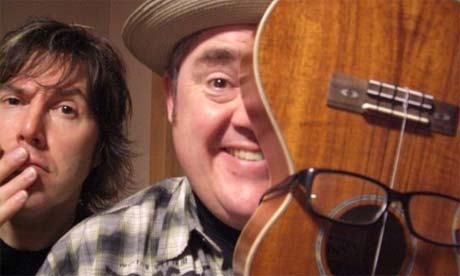The Perfect Podcast.
Recently I was a guest rogue on episode 301 The Skeptics Guide to the Universe. This required staying up very late, drinking a lot of coffee and trying not to sound too much like an idiot.
You’ll be happy to know all the regular rogues live up to their stereotypes. Steve is like a friendly daddy figure, Evan is relaxed and passionate, Rebecca is funny and sharp witted, Bob gets excited over the smallest detail and most of what Jay says during the recording has to be edited out for taste and decency.

I’ve been a huge fan of the SGU since 2006 and being on the show got me to thinking about what makes a great Podcast.
I listen to both skeptic and comedy podcasts. Rarely to I bother with anything else, though I occasionally listen to news-based shows. All in all, I must listen to over 6 hours of podcasts a week.
WARNING: One thing I love about Podcasts is that they don’t have to self censor, some chose to which is cool, but for anyone interested in checking out the links I post below, be careful. You may hear things that rhyme with ‘stunt’.
My co-podcaster, Simon Dunn has very firm views on the matter of what makes a great podcast (despite not listening to as many as I seem to manage). However, there are rules on which we both agree.
Firstly there is sound quality. Early episodes of many podcasts, for example Collins and Herrin are hard to listen to because of the tinny, irritating sound. I like to listen to the Pod Delusion but occasionally fast forward some correspondents because they are hard to hear when wearing earphones outside.
For our podcast, Sundays Supplement, we invested in good quality microphones. I use a Zoom H4n microphone which not only gives you good desktop sound but also is very useful in the field when interviewing, Stewart Lee backstage at a comedy night, Crispian Jago at TAM or A.F. Harrold in his living room.
Content is also key. I love Little Atoms for this reason. Neil Denny is a superb interviewer and so throughly researched that within seconds of starting an interview he managed to get to the root of the juiciest debates on nearly any subject you care to mention. Not only this but having some people you’ve heard of, science celebrities as it were, does make listening even more engaging. (It is a shame that I’m so biased about such things, but I have a monkey brain, and want to hear from people higher up in the troop. I can’t help it.)
Length is contentious issue, while I love listening to the SGU while travelling to gigs, for Simon, it is nearly always too long. At over an hour, it does seem like a marathon but the shorter version SGU 5×5 is not as good. You don’t get the personalities of the rogues coming through, it is less relaxed, and despite being in bite-sized chunks hasn’t got the following of its sister.
We always aim for 20-25mins and this seems about right for us, I tend to think the half hour mark is a good one, though I think some of the most popular podcasts scoff at this theory.
One way around the length issue is to break up the time with regular features, and I approve of these, as structure makes the podcast easier to listen to. You can pause before Science or Fiction on the SGU and take a break.
Equally however, there are podcasts which seemingly have no structure at all Smodcast being one of them. Here though, the podcast is held together by the personality of the presenters. Kevin Smith will always be a great storyteller, happy to admit his ignorance and Scott Mosier will always use his dry skepticism to reign him in. Likewise Collins and Herrin both rely on the show off vs victim relationship that my own podcast plays on. (I’m the know-it-all show-off, Simon is the complaining loser – only a minor tweak of reality is needed for this transformation).
Audience interaction is always a bonus. On my podcast this comes in the form of fan and hate mail. On Little Atoms and Smodcast it comes in the form of live shows. The SGU use lighthearted competitions ‘Who’s that noisy?’ and like Brian Dunning’s Skeptoid, have regular audience feedback.
Noises are good. Theme music (none more ear-catching than Little Atoms) unites the podcast together and gives it a sense of form.

Chistian Reilly on As It Occurs To Me (live sketch-show podcast) not only unifies the podcast, (transforming it from particle to wave as it were), but also amplifies the comedy, often rescuing weaker sketches.
A truly brilliant podcast therefore marries these elements. So Phill and Phil’s Perfect 10 is ideal.

Recorded in a professional studio or live theatre, ten questions are sent in by the audience to two distinctive personalities (grumpy and funny), one of whom is a TV comedian, who have just thirty minutes to answer them all… and there is a bell.
All it lacks is science. Damn.


I agree about sound quality. The often interesting Conversations From The Pale Blue Dot (an ex-Christian interviewing various thinkers usually on topics around philosophy of religion, atheism, and morality) is a less-known podcast I often recommend, but with the caveat that sometimes the quality is unlistenably bad. I actually stopped subbing to the Pod Delusion for the same reason, and also the 21st Floor. (I have to say I can’t really get into SGU. I don’t find them roguish, I find them supercilious and smug.)
Have you tried the SETI podcast Are We Alone? Sounds a bit cranky, but it’s actually very good, covering a wide range of scientific topics. They’re very keen to put a lot of distance between themselves and UFO/conspiracy types, and so feature a monthly Skeptic Check special focussing on debunking.
I was interviewed on a podcast, and the interviewer was reading my blog as he was doing the interview. Then he said I was wrong when I told him how old my blog was.
To top it off, in the middle of the interview, he stopped to say that he was looking for a job.
Now I might be harsh because I have a journalism degree, but if you’re going to do an interview, make sure you research the subject as much as possible. Especially if you want to fill a podcast.
Just wanted to say that you were wonderful on SGU, Iszi! Hooray!
Just a side note. I credit a lot of my skepticism to Scooby Doo.